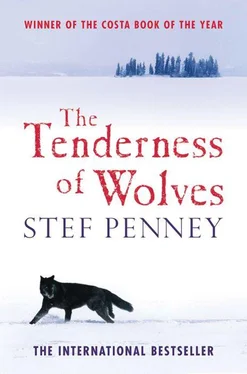I must have fallen asleep in the chair, because I wake when it is nearly light, stiff and cold. Francis has not returned. Much as I try and tell myself it is a coincidence, just another extended fishing-for-nothing trip, the thought keeps coming back to me that my son has disappeared on the day of the only murder that Dove River has ever known.
First light falls on three riders making their way from the west. They have been travelling for hours already, and daylight comes as a relief, especially to the man at the rear. Donald Moody finds the half-light a particular strain on his weak eyes; no matter how he rams his spectacles up against his nose, this monochrome world is full of uncertain distances and subtle, shifting shapes. It is also freezing. Even wrapped in layers of wool and a skin coat with the fur on the inside, his limbs are numb and long past aching. Donald breathes in the thin, sweet air, so different from that of his native Glasgow, sooty and raw at this time of year. The air is so clear that the unhindered sunlight seems to travel further; when the sun has just broken the horizon, like now, their shadows reach behind them forever.
His horse, which has been crowding the mount ahead, stumbles and rams its nose into the grey’s hindquarters, earning a warning swish of the tail.
‘Curse you, Moody,’ says the man in front of him. Donald’s brute of a mount is continually either lagging behind or bumping into the quarters of Mackinley’s beast.
‘Sorry sir.’ Donald tugs at the reins and the horse flattens its ears. It was bought from a Frenchman and seems to have inherited some of his anti-British prejudice.
Mackinley’s back radiates disapproval. His mount is perfectly behaved, like the horse in front of him. But then Donald is continually being reminded of his greenness–he has been in Canada just over a year and still makes huge blunders with Company etiquette. No one ever warns him in advance, because almost their sole entertainment is to watch him struggle along, falling into bogs and offending locals. Not that the other men are exactly unkind, but it is clearly the way here: the most junior member of staff must serve his apprenticeship as a figure of fun. Most of the Company men have education, courage and a spirit of adventure, and find their lives in the big country sorely lacking in incident. There is danger (as advertised), but it is the danger of frostbite or exposure rather than unarmed combat with wild animals or war with hostile natives. Their daily lives are made up of petty endurances–of cold, darkness, screaming boredom, and the overconsumption of bad liquor. Joining the Company, Donald realised early on, was like being sent to a labour camp, only with more paperwork.
The man in front, Mackinley, is the factor of Fort Edgar, and leading them is a native employee, Jacob, who insists on accompanying Donald everywhere, rather to his embarrassment. Donald does not much care for Mackinley, who is sarcastic and bluff by turns–a two-pronged method of deflecting the criticism he seems to expect from every quarter. He guesses that Mackinley is so touchy because he feels socially inferior to some of the men beneath him, Donald included, and is constantly on the look-out for signs of disrespect. Donald knows somehow that if Mackinley were less concerned about such things, he would be more respected, but the man is not likely to change now. As for himself, he is aware that Mackinley and the others regard him as a rather effete bean counter; useful enough, but hardly a real backwoods adventurer in the old style.
When he got off the ship from Glasgow, he meant to be himself, and let the men take him as they found him. But he has in fact made valiant attempts to improve his image in their eyes. For one thing, he steadily increased his tolerance of the rough alcohol that is the lifeblood of the fort, although it does not agree with him. When he first arrived he would sip politely at the rum they decanted from vast smelly barrels, thinking he had never tasted anything so disgusting. The other men noted his abstinence, and left him marooned as they journeyed into the realms of drunkenness, telling long, boring stories and laughing repeatedly at the same jokes. Donald put up with this for as long as he could, but the loneliness weighed on him until he could no longer bear it. The first time he got spectacularly drunk the men cheered, slapping him on the back when he vomited onto his knees. Through the nausea and acrid dampness Donald felt a kernel of warmth: he belonged–finally they would accept him as one of them. But, although the rum no longer tasted as bad as it once did, he was aware that the others treated him with a sort of amused tolerance. He was still just the junior accountant.
The other bright idea he had to prove himself had been to organise a rugby football match. Overall this was disastrous, but out of it had come one small ray of light, which causes him to pull himself straighter in the saddle.
Fort Edgar is a civilised posting compared to most of the Company’s forts. It lies near the shore of the Great Lake, a huddle of wooden buildings inside a palisade–the whole obstinately sheltering from a stunning prospect of islands and bay behind a belt of spruce. But what makes Fort Edgar civilised is the proximity of settlers, and the nearest are at Caulfield on Dove River. The residents of Caulfield are happy to live near the trading post as it is stocked with imported English goods and upstanding Company men. The traders are equally happy to be near Caulfield, as it is stocked with English-speaking white women, who can occasionally be persuaded to decorate the fort’s dances and other social events–like rugby matches.
On the morning of the match, he found that he was nervous. The men were sullen and bleary-eyed after a marathon drinking session, and Donald was unnerved to see a party of visitors arrive. He was even more unnerved when he met them–a tall, stern-looking man who was the image of a hell-fire preacher, and his two daughters, who were excited to be surrounded by so many youngish, unattached men.
The Knox sisters watched the proceedings politely, utterly mystified. Their father had attempted to explain the rules, as he knew them, on the journey to Fort Edgar, but his grasp of the game was rusty and he had only confused them more. The players moved around the meadow in a large ragged knot, the ball (a weighty lump stitched by a voyageur’s wife) generally invisible.
As the game progressed, the mood darkened. Donald’s team seemed to have reached a consensus to keep him out of the game, and ignored his shouts to pass to him. He ran up and down, hoping the girls could not tell that he was superfluous, when the ball came rolling towards him, leaking bits of furry stuffing. He picked it up and ran up the pitch, determined to make his mark, when he found himself on the ground, winded. A short half-breed, Jacob, grabbed the ball and ran, and Donald gave chase, determined not to let his opportunity slip. He hurled himself at Jacob, slicing the man’s legs from under him in a severe but fair tackle. A giant steersman scooped up the ball and scored.
As he lay on the ground, Donald’s triumphant cheer gurgled in his throat. He lifted his hands from his stomach to see them dark and warm, and Jacob standing over him with a knife in his hand, his features slowly animating into an expression of horror.
The spectators eventually realised something was amiss and rushed the pitch. The players gathered round Donald, whose first recognisable emotion was embarrassment. He saw the magistrate bending over him with an expression of avuncular concern.
‘… barely injured. Accident … heat of the moment.’
Jacob was distraught, tears running down his face. Knox peered at the wound. ‘Maria, pass your shawl.’
Maria, the less pretty daughter, tore off her shawl, but it was Susannah’s upside-down face that Donald fixed on as the shawl was pressed to his wound.
Читать дальше












